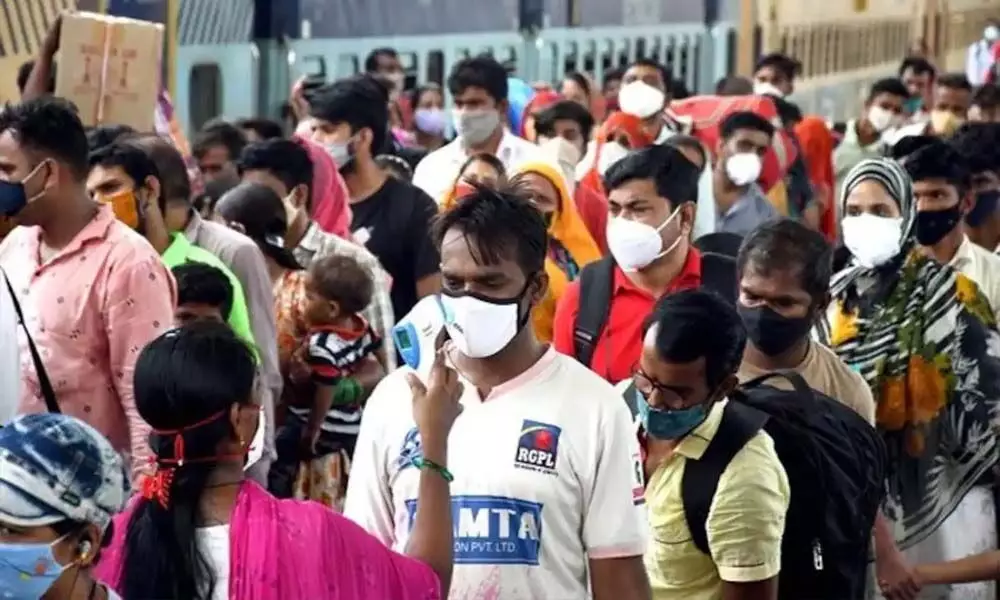Can India prevent 3rd Covid wave?
The country needs to reach 8.5 to 9 mn doses daily to meet its target of vaccinating the eligible population by the end of 2021
image for illustrative purpose

Delta plus is related to the Delta, an existing variant of concern first identified in India last year that was responsible for the deadly second wave. India has administered at least one dose to 22.4 per cent of the population till July 9 while only 5.3 per cent has been fully vaccinated yet.
The outcome of the third wave also depends on what level of immunity India's population has - both from prior infections and from vaccines. The country averaged 3.25 million doses every day between 9 and 22 June. But it needs to reach 8.5 to 9 million doses daily to meet its target of vaccinating the eligible population by the end of 2021. India has administered 369 million vaccine doses so far (till 9 July 2021).
People in India will need to stay alert and careful, follow safe behaviour protocols, and be especially alert during the festive period of October-November this year. People who were exposed to Covid-19 in the first wave would also show a significant waning of antibodies by then. Current data suggests that they would still get infected, but would be protected from severe disease, hospitalisation, and mortality.
Professor Neil Ferguson, from the School of Public Health at Imperial College London, said: "The lifting of mandatory restrictions on 19th July is a calculated risk. If individuals remain cautious in the face of rising levels of infection, our analysis suggests that the third wave will be substantially smaller than if contacts immediately revert to pre-pandemic levels. However, a large third wave of infections is inevitable if mandatory restrictions are lifted. It is much harder to predict what this will translate into in terms of hospitalisations and deaths. The link between cases and hospitalisations has been weakened but not severed."
According to WHO, Outbreaks have been reported in restaurants, choir practices, fitness classes, nightclubs, offices and places of worship where people have gathered, often in crowded indoor settings where they talk loudly, shout, breathe heavily or sing. The risks of getting Covid-19 are higher in crowded and inadequately ventilated spaces where infected people spend long periods of time together in close proximity. These environments are where the virus appears to spread by respiratory droplets or aerosols more efficiently, so taking precautions is even more important.
Globally, in the past week the number of new cases and deaths both increased when compared to the previous week. Nearly 3 million new cases of Covid-19 were reported globally and with just under 56,000 new deaths in the past week; cumulative deaths have now surpassed 4 million. All regions apart from the region of the Americas reported increases in new cases in the past week and the largest increase in new deaths was observed in the African region.
The rapid spread of the delta coronavirus variant has forced a growing number of countries to reimpose lockdowns and other public health restrictions, raising fears that the more contagious variant was hampering global efforts to contain the pandemic.
The new curbs on travel and daily life stretched from Australia and Bangladesh to South Africa and Germany, where authorities over the weekend set new limits on travellers from 'virus-variant zones' such as Portugal and Russia.
Health experts have warned that the delta variant - which was first identified in India - is on track to become the most dominant version of the coronavirus worldwide. The World Health Organization said last week that it has been detected in at least 92 countries.
Several coronavirus vaccines have been approved for use, either by individual countries or groups of countries, such as the European Union and the World Health Organization (WHO).
Of the 193 countries and territories administering vaccines and publishing rollout data, 67 are high-income nations, 101 are middle-income and 25 low-income. Overall, China and India have administered the highest number of doses, with about 1.4 billion and 390 million respectively. The US ranks third, with more than 335 million.
But when breaking the figures down by doses per 100 people in countries with a population of at least one million, the United Arab Emirates, Bahrain and Israel top the list. The UK and some other European countries are now seeing a rise in cases once again, driven by the Delta variant of the virus. Russia is currently seeing more than 20,000 new cases every day and over 700 deaths - the highest daily death figures the country has seen since the pandemic began. However, the pace of Europe's Covid-19 vaccination campaign has picked up and lockdowns are being eased in many countries.
A national lockdown would be pointless, but rather the solution would be to have many state-level lockdowns to target hotspot areas. The national government needs to be in a support role, first and foremost, providing oxygen to states and looking at oxygen management.

